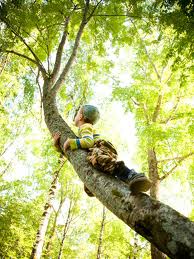 It’s intriguing that my children are not only allowed, but encouraged to climb trees, while other children I know are forbidden to climb trees. I’ve asked parents why they don’t let their children climb trees. They’ve told me they are afraid their children will get hurt.
It’s intriguing that my children are not only allowed, but encouraged to climb trees, while other children I know are forbidden to climb trees. I’ve asked parents why they don’t let their children climb trees. They’ve told me they are afraid their children will get hurt.
You have to understand, when I’m talking about trees, I’m talking about small trees in our neighborhood with adult supervision. I’m not talking about 80 foot trees in wooded areas were there’s no supervisions.
My children have been encouraged to take calculated risks that are physical in nature.
They have spent their childhood doing gymnastics in our family room, climbing on monkey bars at playgrounds and in our yard, playing sports inside and outside, climbing trees in our neighborhood, etc.
Many benefits have come from participating in these activities. Don’t get me wrong, they certainly have gotten a few bumps and bruises along the way. The rewards far outweigh the risk though.
When kids grow up climbing trees, they learn to take calculated risks. They practice good judgment and proper decision making…
What branch should I grasp with my hands?
What branch should I step on with my feet?
Is that branch sturdy enough to hold me?
Which branch should I move to next to get higher up the tree?
How high should I go?
What path should I take to get back down?
Should I jump down or climb all the way down?
Children desire independence. As they become more independent, they gain confidence and emotional strength.
Growing up with a healthy balance of independence, confidence and emotional strength makes childhood easier.
I’ve seen plenty of children over the years that aren’t thriving. Just about every child in that category lacks confidence and emotional strength. Many of them feel like nobody likes them. Many of them are bullied. Many of them are outcastes. Other kids don’t want to play with them.
When this happens, many times the child in question should take some responsibility for their plight, but the parents should take the lion’s share of the responsibility.
Parents who instill an appropriate amount of independence, confidence and emotional strength in their children don’t have outcast children who feel like nobody likes them.
This is parenting 101, but how many parents know it?
It’s much easier to not do your job as a parent and then blame it on school employees for not doing their job or blame it on the mean kids who don’t want to play with your child.
I am, by no means, condoning the behavior of school employees who don’t do their job or mean kids, but they wouldn’t have anyone to be mean to if all kids were taught to stand up tall and be confident and emotionally strong. Bullies would have no one to bully.
Climbing trees develops physical strength, balance, agility and coordination. Growing up with these traits decreases the likelihood of falling down while playing. Even when a strong child does fall, their chances of getting injured are lower than when a weak child falls.
The kids who grow up climbing trees are actually less likely to get hurt in the long run than the kids who aren’t allowed to climb trees due to the fact that their parents think they are going to get hurt if they do so. Its kind-of ironic!
Kids who get picked on are usually weak in these areas also, so they wind up getting emotionally hurt frequently as well as getting physically hurt.
“Hypee” is a word my wife uses when she describes how she feels when our daughters are taking a risk that could end up with a fall or injury. She feels anxious or nervous, but we now call it “hypee”.
I’ve been coaching my wife on the topic of calculated risk vs. reward and reassuring her for many years that the benefits outweigh the potential hazards.
She has certainly gotten less hype over the years, but I don’t think it will ever go away totally.
She has an instinct to protect her children, which has been a beneficial instinct on many occasions. She sometimes wants me to be more protective and I sometimes want her to be less protective.
Being under protective can be as damaging as being overprotective, so we try to balance each other. The parents who will not let their children climb trees are overprotective, otherwise known as helicopter parents. They are constantly hovering over their children in an effort to catch them every time they fall. These parents are doing a disservice to their children.
Children become responsible by being given responsibility and they become trusted by making good choices.
As these things have happened, I backed up farther and farther away from the tree. When they were beginners, I stood right there with them with my hands up ready to catch them if they fall.


























Good article, how true
You can’t let your kids live in a bubble, but at the same time you want to keep them safe. I think it all boils down to your child. Do they learn every time they push the envelope? If they learn what makes a good climbing tree and what doesn’t then they know what they can and can’t do. If they learn their limits they know how hard they can push themselves.